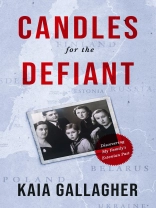As Kaia Gallagher sought to learn how her Estonian family survived during World War II, she discovered the compelling story of one man’s brave defiance as he resisted the Soviet occupation of Estonia.
During the second World War, the residents of the Baltic states fought to preserve their independence when they were brutally occupied first by the Soviets in 1940 and then by the Germans in 1941, only to be later forcibly integrated into the Soviet Union at the end of World War II.
By accessing historical files from the Estonian National Archives, Kaia discovered the tragic story her mother never wanted to remember. After the first Soviet invasion of Estonia, Bruno Kulgma Kull, who was engaged to her mother’s sister, volunteered to join the Communist Party to spy for the Estonian leaders. Yet, only a year later, he found himself condemned as a traitor when the German army forced the Soviets to retreat and then enforced their own system of justice over Estonia.
Many like Kaia’s family escaped at the end of the war. Yet, they retained the memory of Estonia’s independence and then cheered when staunch Baltic patriots finally enabled Estonia, Latvia, and Lithuania to regain their independence more than fifty years after World War II ended.
This story is one of patriotism and determination that reveals the resilience of the Baltic people and their enduring commitment to freedom, democracy and independence despite the odds against them.












